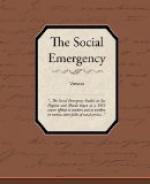Rightly taught, reproduction may be cleansed from the foul interpretations which have soiled the minds of countless children, and may be made into a body of wonderful and sacred truths capable of fortifying youthful minds against the uncleanness and indecencies which have contributed so largely to sexual impurity. If it be never forgotten that human ingenuity has been taxed in untold numbers of unsuccessful experiments to produce life by other than nature’s methods, while the power of reproduction resides in even the lowliest of living organisms, the mystery and marvel are multiplied a hundredfold, and the subject of reproduction is invested with a halo of splendid and inspiring proportions.
* * * * *
The sex organs are the agencies by which every plant and every animal, each after its kind, brings into the world a succeeding generation. Sex activity is the result of sex impulse. The imperative need of reproduction in the scheme of nature is responsible for the presence of sex impulse as it occurs in every normal adult animal. Were it not for this impulse the earth would soon become void of life. The human sex impulse is a powerful one, thought compelling, at times well-nigh overmastering. Though in the main good, it sometimes produces harmful results. Among the lower animals the sex function is exercised without thought or knowledge of consequence, restrained only by the limitations of physical power,—the power to obtain by might, by conquest. In fully developed mankind, the mind acts as a constraining force which may control or even completely subdue physical manifestations of sex impulse.
In adolescents—those who are approaching maturity, but are in a transition state, neither man nor child—sex desire may be as strong as in those of riper years. Many who are passing through this period know little or nothing of the forces that pulse through their frames and seem to consume them with unquenchable fires. These forces are the sex impulses, the beginning of sex life and sex activity. And as every work of man or nature while in a state of transition is unstable, less firmly founded, more easily destroyed or injured than at any other time, so it is that the adolescent finds himself in greater danger than at any other time of life. Consumed with incomprehensible desire, which he cannot gratify, he is the victim of circumstances which cause him distress, yet admit of no relief.
Probably all marriage laws have as their real object the protection of child life. Without marriage laws there could be no organized society and the human race would soon sink to the level of the animal world in general. Under present social conditions marriages are put off longer and longer. Each succeeding generation is marked by an increase in the age of those who marry. But the conditions which cause late marriages in no way lessen the sex impulses or mitigate the distress which these impulses cause.




